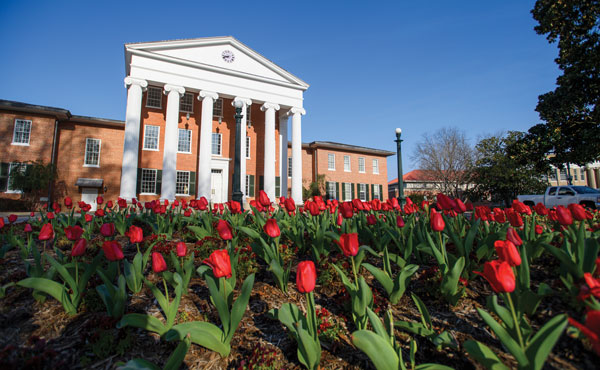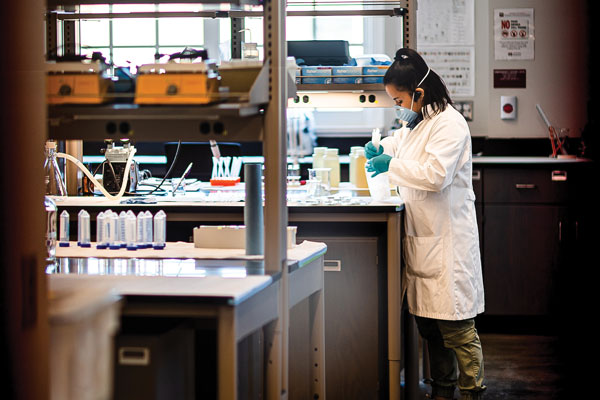Mississippi’s public universities are committed to providing a diverse range of educational opportunities for their students. With over 900 degree programs available, these institutions ensure that students have access to the resources and support they need to succeed in today’s dynamic economy. Through innovative teaching methods and hands-on research experiences, students are equipped with the skills and knowledge necessary to excel in their chosen fields.
Mississippi State University
Nationally recognized as a top research university, Mississippi State University (MSU) amassed more than $300 million in research expenditures in 2023. At its Starkville campus, numerous projects in various focus areas are currently underway: agriculture, natural resources and conversation, aerospace engineering, manufacturing engineering and material sciences. MSU accounts for over half (53.6%) of the $565.3 million in research expenditures reported by all Mississippi institutions.
However, one of MSU’s most monumental announcements last year isn’t associated with research. In April 2023, the university received a historic $100 million gift from George and Kathy Bishop to fund the George Bishop Family Endowed Scholarship program.
The Smith County native and scholarship namesake earned a degree in petroleum geology from the land-grant institution in 1958. In 1981 he founded GeoSouthern Energy, which grew to become one of the largest privately held producers of oil and gas in the country.
“Mississippi State opened many doors for me and gave me the foundation I needed to be successful. So, when the opportunity arrived for me to be able to give back to the place that’s been so influential for me and many others, it just felt right,” said Bishop. “It’s a blessing to help people, and I especially want to help students that have the desire to work but don’t have the funds to accomplish their goals on their own.”
University of Mississippi
Known for its strong programs in law, business, pharmacy and engineering, the University of Mississippi serves as a major educational and research hub in the state. For the fall 2023 semester, Ole Miss welcomed the largest freshman class at any university in the state’s history with 5,241 freshmen, a 7.7% increase from the previous year.
To support enrollment growth, the university will construct three new campus residence halls on the former site of Kincannon Hall, which was recently razed. The new construction will allow for almost 1,000 more student occupants on campus.
In addition to this project, Ole Miss is currently constructing a new 202,000-sq-ft. facility for STEM programs and research, the Jim and Thomas Duff Center for Science and Technology Innovation. Backed by a $175 million investment, the new facility is slated to house teaching space and laboratories, with construction expected to be completed by fall 2024.
To further support the growth of STEM education degree attainment at Ole Miss, the National Science Foundation has awarded the university a $300,000 grant from the organization’s ADVANCE program, which seeks to eliminate the barriers that restrict opportunities for women faculty to participate and advance in STEM fields. This funding will support research related to gender equity and representation in science, technology, engineering and mathematics fields at the institution.
Delta State University
Located in Cleveland, Delta State University is a significant force transforming the Mississippi Delta region. With more than 40 undergraduate programs, 26 graduate programs and two doctoral programs, the university offers students in the region the opportunity to forge good-paying careers alongside pursuing their interests. Its economic impact totals $175 million, including a $110 million knowledge impact and a $65 million spending impact.
To continue this upward momentum and invite further development opportunities to the region, the U.S. Department of Education has awarded DSU’s Student Success Center a $2.2 million, five-year grant. This funding will finance Destination Graduation, a program to help current undergraduate and graduate students overcome barriers to continued enrollment and persist to graduation.
By increasing access and awareness of financial aid opportunities and support services such as summer bridge, supplemental instruction and tutoring, DSU aims for this program to increase retention and reduce temporary withdrawals.
 The University of Mississippi, Oxford
The University of Mississippi, Oxford
Photo courtesy of Ryan M. Whittington, Ole Miss Digital Imaging Services
Jackson State University
From innovative solutions in renewable energy and environmental studies to advancements in health care and technology, Jackson State University is on the cusp of countless groundbreaking discoveries.
One of JSU’s most recent projects is the establishment of the Delta Mississippi Center of Excellence (CoE) in Maternal Health, which will evaluate innovative approaches to reduce pregnancy-related complications and deaths and promote maternal health equity. The center is part of the National Institutes of Health’s Implementing a Maternal Health and Pregnancy Outcomes Vision for Everyone (IMPROVE) initiative and will receive more than $17 million over a seven-year period to address maternal health disparities in the Mississippi Delta.
Additionally, in April, JSU Assistant Professor Saiful M. Islam, Ph.D. in the Department of Chemistry, Physics and Atmospheric Sciences won a $100,000 award from phase 1 of the U.S. Department of Energy’s Clean Energy Education Partnership to help build research and education capacity in clean energy at Historically Black Colleges and Universities (HBCUs). JSU is one of the largest HBCUs in the United States.
With collaborators at Austin Elements, Mississippi Valley State University, Oak Ridge National Laboratories, University of Kentucky and the University of Tennessee-Knoxville, Islam plans to spearhead efforts focused on clean energy programming.
Alcorn State University
Located in Claiborne County, Alcorn State University originally began as the nation’s first Black land-grant university. Over the last century and a half, Alcorn State has grown its curriculum to include an array of undergraduate and graduate programs across various fields.
In recent years, the university’s research efforts have been ramping up. This March, the United States Department of Agriculture (USDA) awarded Alcorn State over $1 million for agricultural capacity-building efforts to support research and programming needs.
Chair and Professor of Breeding Dr. Victor Njiti received the largest share of the funds, $589,993, to execute his study entitled Crop Genetic Enhancement Through Genome Editing Technology and Future Agricultural Leadership Cultivation.
“In collaboration with Ohio State University,” said Dr. Njiti, “we plan to develop our capacity in regard to genetics and genetic techniques as well as provide Alcorn students with opportunities for hands-on experiences in these fields. We are proud to bring new tools to plant breeding, such as gene editing tools to modify plant genetics.”
University of Southern Mississippi
The University of Southern Mississippi is recognized for its impactful research spanning fields such as marine science, polymer science, education and health. Situated in Hattiesburg and with locations along the Gulf Coast, USM’s strategic location and innovative projects have attracted significant support from federal agencies.
 Mississippi State University research lab
Mississippi State University research lab
Photo courtesy of Mississippi State University
Last September, USM was awarded a $2.5 million grant from the National Oceanic and Atmospheric Association (NOAA) to support the development of a Data Assembly Hub for Uncrewed Systems (UxS).
“Any investment in advanced marine technology is only as meaningful and innovative as the data acquired,” said Jeremy Weirich, director of NOAA Ocean Exploration. “Through these projects, NOAA’s continued partnership with the University of Southern Mississippi works to ensure that uncrewed vehicles and new technologies yield useful and accessible data that will help the U.S. grow our ocean-based economy.”
Shortly before this announcement, the NIH renewed a five-year research grant totaling more than $21 million for the Mississippi IDeA Network of Biomedical Research Excellence (MS INBRE), which is headquartered at The University of Southern Mississippi. The program is a statewide network of colleges and universities, designed to strengthen the biomedical research infrastructure in Mississippi.
Before the funding was renewed, the network already had established two new research labs at the University of Mississippi and Mississippi State University, as well as a state-of-the-art data science center.

